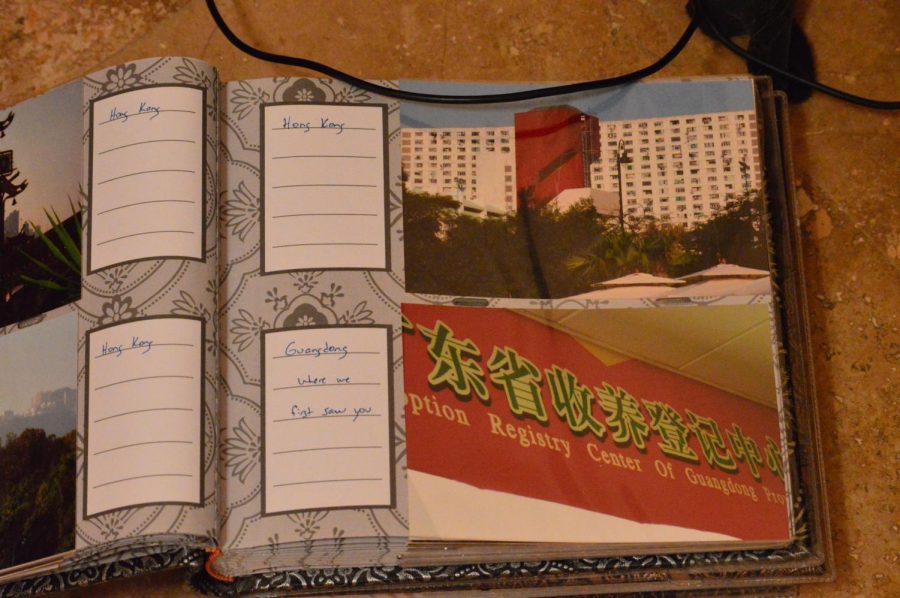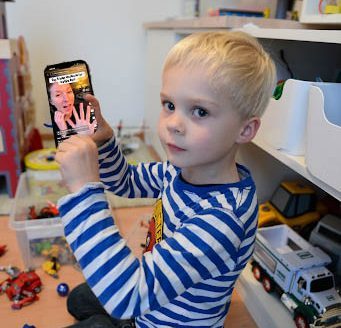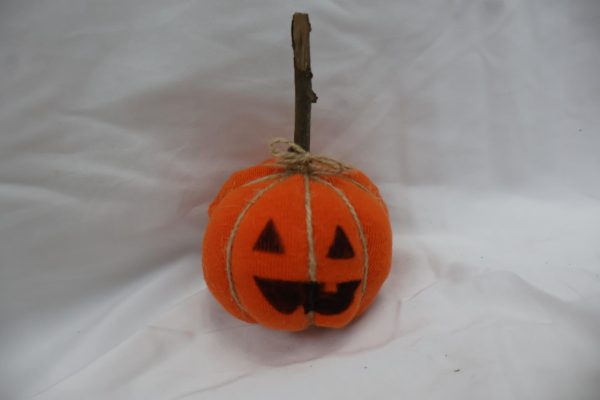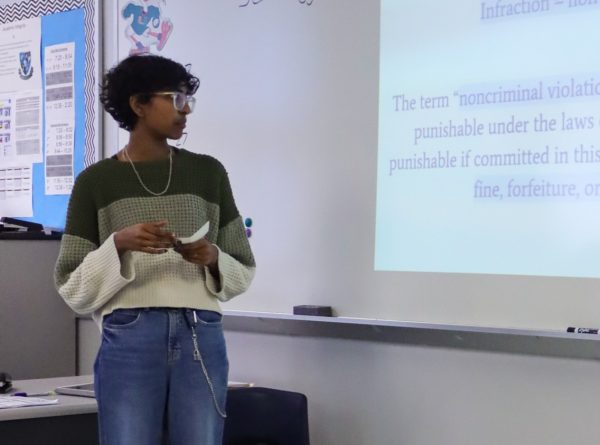A second chance
Students must face challenges that come with being adopted as well as face feelings regarding their past.
photo by Zoey Young
Freshman Alexa Young looks through a scrapbook documenting her adoption process. She is from Guangdong, China.
When Geno Simmons’ teacher dialed the phone to call his mom, he did not understand what was going on. He had just told all of his first grade classmates that he was from Russia, and his teacher was concerned. She thought he was telling the class fictional stories; Simmons was not.
Adopted from Russia at the age of 3, Simmons has always known his story was different. His parents have never hid that information from him, and he has been open about it ever since.
Similarly, senior Jacob Pike, who is adopted from Fort Walton Beach, FL., is always willing to talk about his adoption; he believes it something that makes him unique.
“I am pretty open with my friends about my adoption…. Being adopted is pretty important to me. It definitely sets me apart because I do not have that true blood connection that most families do,” Pike said.
Junior Joshua Rosenblatt feels that it is part of his identity and that being adopted has shaped who he is. Adopted at birth in the United States, Rosenblatt is the only person of Hispanic descent in his family, something that makes him stand out further.
He acknowledges that without adoption, he would not have the same life he has now. Often, adopted children are born into unstable environments; whether, abandonment, etc. Rosenblatt’s birthmother was seventeen, trying to raise one of his siblings while also being homeless. She was unable to support Rosenblatt and had to give him up for adoption.
“It is funny knowing that one decision could have altered my life permanently. She was living on her own, raising one of my siblings trying to make ends meet, so my life would be much harder if I had not been adopted,” Rosenblatt said.
Senior Alexa Edney, who was born in China, believes that she would have been helping out at an orphanage or even on the streets. CCAI Adoption Services, a popular agency for children from China informs potential parents that children age out at 14 and are no longer able to be adopted once they reach that age.
China is a unique place to adopt children, specifically girls. This is due to the One Child Policy the Communist Party had implemented ; families were only allowed to have one child, with the exception of some conditions. Often girls were killed or given up, so the family would raise a son instead. This resulted in a large influx of girls in orphanages. The policy has since been lifted.
Adoption can also raise issues, not just problems with their past. These include being left out of certain activities and prying people with rude comments. Freshman Alexa Young had to miss out because she did not have the information required to do a school project in elementary school; instead she spent the day sitting in the principal’s office. Young needed information about her birth, such as weight and time of birth, something Young could not provide. So as not to take up space, Young was moved to a different area.
Edney also occasionally feels like an outsider.
“Sometimes I feel left out because of stuff that doesn’t even run across someone’s mind, like blood type or family history,” said Edney.
Young and Edney were both adopted from Southern China at young ages, with no recollection of their past life. Adopted children are usually left without information or knowledge of their birthparents, family history or any other records. Psychologist Nicholas Zill at the Institute for Family Studies reports that many adoptive parents are not given any information about child’s birth mother or family information.
Besides being unincluded, adopted children must deal with certain stigma others have about them. Carlson is irritated when people are ill-informed about the subject.
“People in public who ask questions only bother me when they’re uneducated. i.e. when they say, ‘“Do you know your real parents?” I’m just confused that a person can be that ignorant because my adoptive parents are my real parents,” Carlson said.
While Edney understands that her birthparents loved her enough to give her a chance at a better life, she does not want to meet them.
“They are just people who gave me life. They aren’t my parents which are the ones who’ve raised me, taught me, gave me the way I live today,” Edney said.
To combat rude encounters, Pike reminds himself and others that he was chosen by his parents, whereas others were given no choice in the matter.
There is also a variety of feelings adopted children have about their birthparents, such as whether or not they would want to see them again. Pike believes that he might eventually reach out to his biological mother, but he has no idea what he would say. Rosenblatt would also want to know his biological family as well.
“I would want to see them, so I know where I came from. I would also like to catch up with them to see how they have done with life and where they have ended up,” Rosenblatt said.
On the other end of the spectrum, Simmons is not interested. He feels that he was too young to ever really know them. Senior Katie Carlson, who was adopted from China, would also turn down the chance to meet her birthparents; adoption rarely crosses her mind as she is accustomed to the life she has now.
“If given the opportunity to meet my biological parents, I wouldn’t. I just have no interest in doing so and think some things of the past are best unanswered,” Carlson said.
Edney also understands that her birthparents loved her enough to give her a chance at a better life, yet she does not want to meet them.
Despite different nuisances and challenges that come with being adopted, many students are grateful for where they are today. Simmons cannot imagine anywhere else he would be; he believes that his parents are “great and will always be,” and is content. Young is happy that she has more opportunities and a loving family that will support her through any situation. Carlson also notes that adoption has not made any real challenges for her and has only served to make her life better.
“I think it’s a beautiful thing,” Carlson said. “I am grateful.”
Your donation will support the student journalists of Hagerty High School. We are an ad-free publication, and your contribution helps us publish six issues of the BluePrint and cover our annual website hosting costs. Thank you so much!







